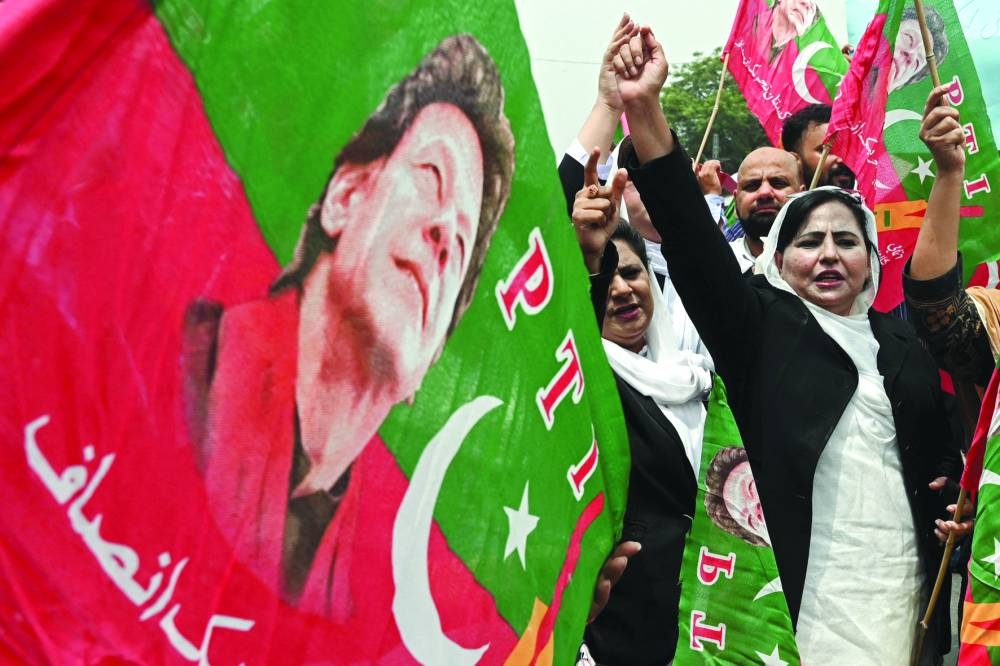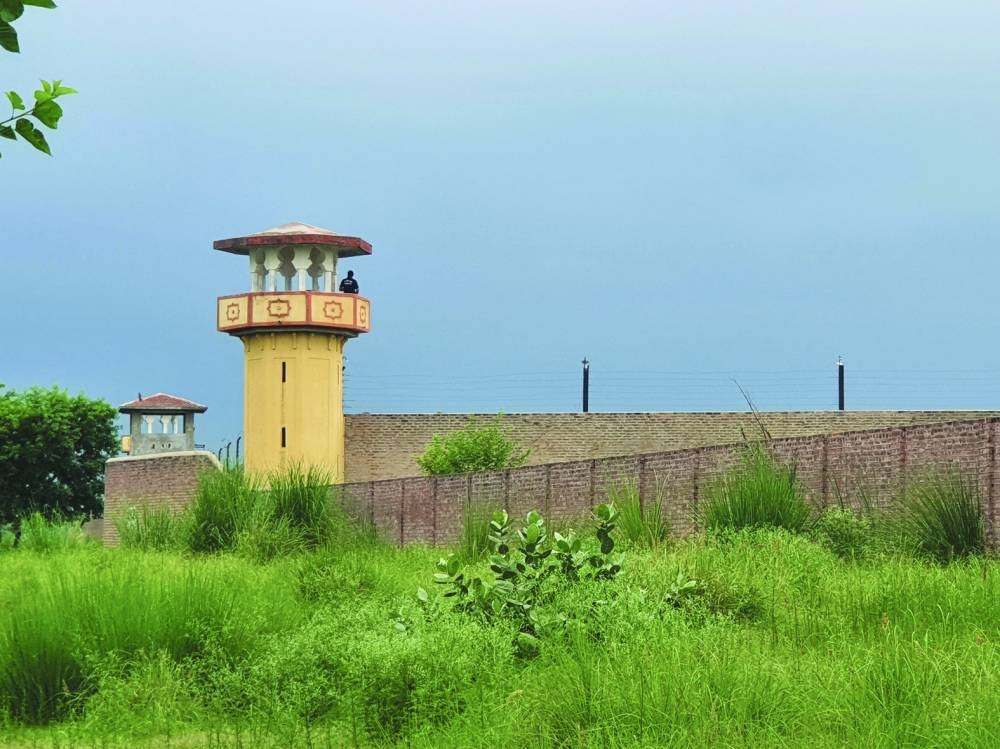Former Pakistan prime minister Imran Khan was in good spirits despite tough conditions in jail, his spokesman said yesterday, following a conviction that has ruled him out of contesting elections due later this year.
The former international cricket star was arrested Saturday and whisked to prison after being found guilty in one of the more than 200 cases he has faced since being controversially ousted from office by a vote of no confidence in April 2022.
There were small, scattered protests — including outside Lahore High Court, where a few dozen people gathered — but Khan’s street power has drastically diminished since authorities cracked down three months ago and rounded up thousands of his supporters.
A lawyer met Khan yesterday at a century-old jail on the outskirts of historical Attock city, around 60km west of the capital, to obtain power of attorney so his team could press ahead with a series of legal challenges.
“He is being held in deplorable conditions not fit for any human, but he is in good spirits,” Khan’s spokesman Raoof Hasan told AFP.
“He said to ‘tell the people that I will not compromise on my principles’.”
The 70-year-old is being held in a so-called “C-class cell”, sleeping on a mattress on the floor and with only enough room for a prayer mat. There is little access to daylight, and a fan but no air conditioner in the summer heat, Hasan said.
Lawyers were able to gain power of attorney from Khan, allowing them to file a bail application on his behalf and also appeal for him to be moved into an “A-class cell”.
“We’re hopeful that we will be able to secure bail and the decision will be suspended and the disqualification revoked,” said Hasan.
At a court hearing that Khan did not attend on Saturday, a judge found him guilty of failing to properly declare gifts he received while in office and sentenced him to three years in jail. The sentence disqualifies Khan from taking part in elections, although many politicians — including current Prime Minister Shehbaz Sharif and his brother, former premier Nawaz Sharif — have recovered from convictions or had them overturned to make a comeback.
Parliament is due to be dissolved tomorrow, days ahead of the end of its natural term, giving the interim government 90 days to hold an election.
But there is already speculation the vote could be delayed following the release at the weekend of the country’s latest census data. Law minister Azam Nazeer Tarar told a local TV channel that constituencies would have to be redrawn according to the new census, warning there could be a delay to polls of up to two-and-a-half months.
Khan’s arrest and detention for three days in connection with the same case in May sparked deadly violence, with his supporters taking to the streets in the tens of thousands and clashing with police.
It also prompted the crackdown that saw almost all of his top leadership arrested or forced into hiding, leaving the party scrambling to set up a replacement decision-making body.
Khan’s Pakistan Tehreek-e-Insaf (PTI) party won a by-election over the weekend, and in a second vote came behind an independent candidate, who had already promised the electorate to go with the PTI, with both polls held in his stronghold of Khyber Pakhtunkhwa province.
“His being in prison is not going to dent his popularity,” Hasan said. “He is the leader of the people and there is every reason for the establishment to sit down and talk to him.”
In the eastern city of Lahore, where Khan was arrested Saturday, a few dozen lawyers and PTI supporters gathered outside the High Court to protest against his conviction. “God willing, we lawyers will continue to stand firm against this illegal and unlawful ruling like a rock,” said Irfan Faiz.
In nearby Gujranwala, a demonstration by a dozen or so lawyers was broken up by police, while in Muzaffarabad in Pakistan-administered Kashmir, around a hundred party workers rallied.
The reaction so far has been vastly different to the outpouring of rage that followed his first arrest — even on social media, with half as many Facebook posts mentioning Khan’s name.
“The muted response to his arrest is because of the full-throttle crackdown on PTI workers after the first arrest,” columnist Usama Khilji told AFP.
“The arrests of PTI workers post the May arrest of Imran Khan coupled with draconian laws passed in haste by (the coalition government) have had a chilling effect on Pakistani citizens.”
The prison selected by the government to detain Khan is a lowly and distant facility that houses hardened criminals and does not have facilities that political prisoners are entitled to.
It is a dramatic fall from the lifestyle that Khan, the charismatic cricketer-turned-politician, has along been associated with in Pakistan and abroad as a sporting icon and national hero. “He feels he has been brought to this jail purposely because there are no ‘A-class’ or ‘B-class’ facilities here,” one of Khan’s lawyers, Nameem Panjutha, said after meeting him yesterday, referring to the higher class cells that have more facilities for inmates.
Attock jail, established in 1905 during British colonial rule of the subcontinent, covers 67 acres, with a built structure of 17 acres, according to the facility’s website. It is overcrowded, housing more than 800 prisoners against an authorised accommodation of about 530, the government website says. Attock jail is not as high-profile or central as other larger prisons such as Adiala jail, where several former prime ministers have been kept in Pakistan’s 76-year history in which no elected premier has completed a full term.
Panjutha said Khan was being kept in a cramped cell, but Gulzar Butt, a retired jailer who served at Attock, told Reuters that the cells in the prison have been modified in recent years to all measure the same 10 foot by 12 foot (3x3.7 metres) size.
While the prison is low-key, officials and witnesses say the security of the prison has been ramped up since Khan was moved there.
Inside, Khan’s lawyers say he is facing testing conditions. “It is a small room which has got an open washroom where he said there were flies in the daytime and insects in the night,” Panjutha said.
He said there was no air conditioning in an area known for high temperatures and humidity during the summer and monsoon months, adding that Khan was spending his time praying and reading the Holy Qur’an.
Khan, the lawyer added, has no access to television, which his lawyers say he is entitled to given that he is a former prime minister. He was being given basic jail food, including lentils and bread, Panjutha said.
The information minister of Punjab, which controls the prison, and the chief of the jail, did not respond to requests for comment on the lawyer’s allegations.
Butt, the retired jailer, said prisoners were categorised into A, B or C at the jail. If a prisoner was deemed to be important, provincial authorities could send instructions to the jail administration.
“The superintendent would then give the prisoner a separate cell, allow his family to provide him food, assign unarmed guards for his safety and provide him with a few prisoners with a good record to serve him ... Mostly, prominent people get B class,” Butt said.
A prisoner can also, on special request, get an air-conditioner installed in the cell at their own expense after approval from the provincial authorities, and would also have to foot the electricity bill themselves, Butt added. — AFP, Reuters
International
Ex-Pak PM ‘held in deplorable conditions’
* ‘I will not compromise on principles’, Imran Khan asks lawyer to tell the nation

Lawyers supporting former prime minister Imran Khan denouncing his arrest during a protest outside the Lahore High Court in Lahore yesterday. Right: A police officer stands guard on the watch tower of the district jail in Attock, where the former prime minister is imprisoned. (AFP, Reuters)

